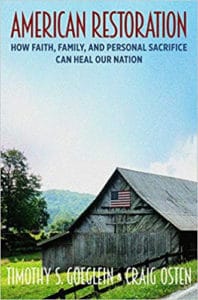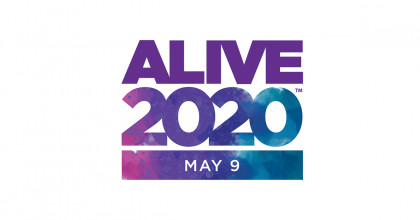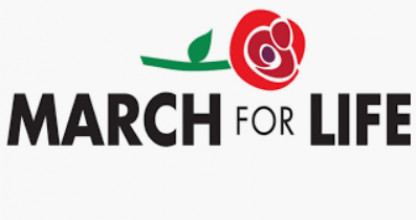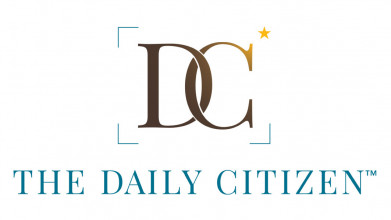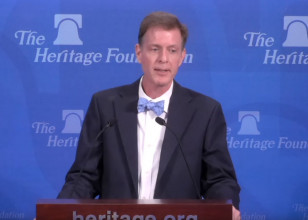Jim Daly: Hi, I’m Jim Daly. Before we start today’s program, I want to take a moment to thank all of you who gave sacrificially to Focus on the Family this past month. Thanks to some generous friends, we had a 9 million match campaign during the month of December. The biggest one we ever had!
And I’m thrilled to report that you met the match! Thank you so much for your faithfulness and encouragement. Not only to our team here at Focus, but to the hundreds of thousands of families, the married couples, parents, children, and single adults who will be blessed by the broadcast and resources that we, together, will provide in 2020.
So, again, thank you for your partnership with Focus on the Family.
Tim Goeglein: Every year – uh, and I’ve lived and worked in Washington for 30 years. Every year, the pro-life march, the March for Life in January, it gets bigger and younger. The Focus on the Family office is right in the heart of it. And, you know, there are so many hundreds of thousands of young people. I mean, the number of pro-life people – black, white, every faith tradition, some no faith tradition – who pour into Washington – it’s extraordinary. This is the great civil rights issue of our era. And it’s going in the right direction.
John Fuller: That optimism is from Tim Goeglein, describing just one of the ways you and I can be more intentional about living out our faith. And how we can work together to restore the foundational values of this great nation.
That’s our topic today on Focus on the Family with your host, Focus president and author, Jim Daly. And I’m John Fuller.
Jim: Hey, John, it’s understandable that some people have a gloomy view of America today. That’s pretty easy to do, given all the news we’re reading and seeing all the time. And there’s not a lot of hope or trust in our national leaders to turn things around, and that’s unfortunate. As Christians, we need to be the people of hope
And admittedly, we face obstacles, too. We see the moral decline in this country. And godly traditions of freedom, faith and family aren’t valued the way they once were. Plus, there are some in our culture who would like nothing better than to silence Christians in the public square.
Did you know, John, that today is National Religious Freedom Day?
John: That is an important day for all of us to recognize.
Jim: It is. And we’re here to celebrate the contributions that Thomas Jefferson made to guarantee religious freedom in this nation
And I think we in the Christian community should celebrate our religious freedom — by renewing our resolve to be salt and light in today’s culture. And to be good, godly citizens in how we vote and fight for those moral laws in this nation.
I love the statement, you know, “Be firm in the middle and soft on the edges.” I love it! And I’m so glad our good friend and colleague, Tim Goeglein, is here to offer a great message of faith and hope to us
John: Well, Tim is the Vice President for External and Government Relations for Focus on the Family in Washington, D.C. He’s served in the government for decades, with Senator Dan Coats of Indiana and under President George W. Bush, among others.
He’s written a wonderful book that we’ll talk more about today. It’s called American Restoration: How Faith, Family, And Personal Sacrifice Can Heal Our Nation. And of course, we have copies of that at focusonthefamily.com/broadcast. Or you can order one by calling 800, the letter A, and the word FAMILY.
Jim: Tim, welcome back to the, uh, microphones here at Focus.
Tim: It’s great to be here. Thank you.
Jim: Now, you’re running that, uh, office out there in Washington, D.C., for Focus. Just day to day, tell the folks what you’re doing to represent Focus on the Family. More importantly, the Lord – uh, when you’re there in that office in Washington, D.C.
Tim: Well, no two days are alike.
Jim: (Laughter) That’s for sure.
Tim: And the – the variety – the era that we’re in in American public policy is really fascinating. I spend my days working in the House of Representatives in the United States Senate, some days at the White House, some days at the State Department. Uh, I attend Supreme Court hearings and am occasionally asked to speak far beyond the Beltway, which I find very refreshing.
Jim: You do, actually, a lot of speaking. I’m so thankful that you’re willing to do that. Your wife, Jenny, puts up with that, I’m sure – being able to travel and speak, and I appreciate Jenny’s support for you in that way. But Ivy League universities have you come in and others to give a perspective of a conservative Christian viewpoint. I think that’s good.
Tim: You know, I was, um, speaking at Brown University (Laughter). In Providence, R.I., a city named for our Lord and Savior Jesus Christ. And after I spoke, a young man came up to me, Jim. And, uh, he was the first person in his family to ever go to college. A scholarship to Brown, born and raised in Boston. He said, “Mr. Goeglein, I can talk about anything at this university, but I cannot speak openly about my faith.”
And I called a friend of mine, Craig Osten. And I said, “Craig, I think we ought to do a book. The book, I think, ought to be called American Restoration because it needs to be rooted in our hope as Christians. But it does not need to be another delineation of all the problems and challenges, per se. What it needs to be is about the way that we can restore and renew and regenerate, uh, this extraordinary country.”
Jim: Yeah.
Tim: I’m really struck by some of the comments that you made, Jim, because I think they are right on point. It is so easy for so many of our fellow Christians to be discouraged and to be despairing. They pop on the television; they open social media. But discouragement and despair is a sin because it negates the hope of Jesus Christ, and especially in the public square.
Jim: Well, not only that, but here’s another hopeful way to look at all this. The Lord knew exactly who would be alive on this earth at this moment. So, he chose you – Christian, believer – to be here, uh, during this time. And I don’t think he wishes for us to be in despair. We’re supposed to be the people who bring hope.
Tim: Absolutely right.
Jim: And that’s what I love about your book. Uh, it’s really well done. You’ve broken the book down into 15 key categories. And we’re not going to be able cover all of those, but that’s why, uh, listeners need to get a copy of this. This a great dissertation on the reason why we need to be engaged in the public square.
You know, some people – we have concentrated on marriage and parenting here at Focus on the Family over the last 10 years, kind of reinventing Focus back to that core. It doesn’t mean we’ve stepped out of that public square, however. We’re just perhaps lower in the profile, but we’re still working with various administrations as they come and go, along with senators, and House representatives and local, state by state, uh, representatives to encourage them on family – strong family, traditional family policies. Right?
Tim: Absolutely. And this is what American Restoration has totally in common with Focus on the Family. You know, the reason that I love Focus on the Family’s icon is, it is a toddler. And the toddler is looking upward. He’s looking upward not just to one person, but he’s looking, uh, upward to two people, to mom and dad. And American Restoration is based in this narrative. This is a book about culture. This is not a book about politics. Culture leads.
And if we are going to restore, uh, our country, culture and civilization, it’s gonna begin not with Washington, D.C., or Silicon Valley, or Hollywood or any of the other sort of elite cities or institutions. It’s gonna begin in our homes, in our marriages, in our communities, uh, in our neighborhoods. Above all, in our churches. You know, this is where the idea of restoration will come. It will start, uh, from the bottom upward, not be imposed, uh, from the top downward.
Jim: And I love that, and I think that’s something we’re always trying to, uh, proclaim here, is that we need to live lives that are worthy of the calling of Christ. And that’s what we try to accomplish each and every day.
All right. Let’s get into it. Uh, one of the big battles in America today is over religious liberty. Which is ironic since, um, the very founding of this nation was based on religious liberty. I mean, that’s why they came from Europe to settle the United States – the Pilgrims, the Puritans. They were seeking a place where they could express themselves in their faith without a king or a monarchy telling them what to do. And why have we, uh, grown into such, um – I guess the right word would be disrepute with the culture? Because Christianity has delivered so many good things to this nation.
Tim: There is an artificial divide now between faith and the public square. And this kind of secularization of the country has become, in fact, a kind of religion.
Uh, we have to remember that it’s not just the Judeo-Christian tradition where the country was founded, but in the social and in the moral revolution of the 1960s and ’70s. It was, Jim, to answer your question, a frontal assault directly, uh, on the Beatitudes, on the Ten Commandments, on the whole body of ethics that forms the Judeo-Christian foundation of the United States of America.
Jim: Explain that connection. Uh, unpack that a little bit, why the Beatitudes are connected there.
Tim: Well, as Christians, our body of ethics begins in the Garden of Eden. It transfers to the Ten Commandments, the natural law, uh, to the Sermon on the Mount. You know, these are not just good ideas. Uh, we are being directed, commanded by our God to say, “This is a really beautiful way to live. It’s a beautiful way to organize a community. It’s a beautiful way to organize a country, a culture, a civilization.” Why? Because it’s rooted in the beautiful, the just and the true.
This is the derivation of the Declaration of Independence. This is the – the foundation of the United States Constitution. And so, any restoration of the country ultimately comes back, uh, to that fundamental principle of the founding of the United States of America, which is, religious liberty and rights of conscience.
My friend, uh, Bobby Jindal, the former governor of Louisiana, brilliantly – he said, “The United States of America did not create religious liberty. Religious liberty created the United States of America.” Bingo. Exactly right.
Jim: Yeah, but it’s amazing how, especially in Washington, D.C., they get that backward – um, to the very point.
What is that antagonism? Why in the public square is Christian thought, Christian ethics, uh, kind of the Christian founding of this country – why is it so despised by those who disagree with the Christian community?
Tim: Because it stands for the idea of objective truth. An objective truth in an era of moral relativism, of situational ethics is considered a kind of bad manners.
You know, just a few weeks ago, I was sitting in the Supreme Court, uh, courtroom. One of the most beautiful spaces on the planet. And I looked up, Jim, above, uh, the – where the nine justices sit. And engraved in the pediment, right over where the chief justice presides over every case in that courtroom, is a depiction of Moses, who is holding a copy of the Ten Commandments.
Jim: The law giver.
Tim: The law giver. A few weeks before that, I was in the House of Representatives for a debate. The only – in the entire House of Representatives – symbol that looks down on the speaker of the House is, again, Moses. When you’re in the United States Senate, uh, the motto, “In God We Trust,” is literally inside of the marble, you know? It goes on and on.
We are a religious republic. It is, uh, unmistakable. We are a city of churches and synagogues. And – and our first president, George Washington, wrote a very famous letter to the Jews of Newport, the oldest synagogue in the United States. And he makes it very clear in this powerful letter that this is a republic that is faith friendly. This is where we come from. This is who we are. We’re not Spain. We’re not Italy. We’re not Germany. We’re not England.
Uh, you know, we have no religious test to hold office. Uh, we don’t have an established church. But that’s not because our founding fathers and mothers wanted to wall off religion – quite the opposite. They said that religion was the virtue nurturer – that virtue, moral excellence, was the other side of liberty, and that was the role of faith.
John: And that’s why we want to encourage you to get a copy of Tim’s book, American Restoration: How Faith, Family, And Personal Sacrifice Can Heal Our Nation. Call 800, the letter A and the word FAMILY. Or stop by focusonthefamily.com/broadcast. When you get in touch, make a generous contribution to sustain the work of Focus on the Family as you can, please.
Jim: Another aspect, um – and there’s so many good things here. We could spend hours just on religious liberty. But moving to the culture of death – and the opposite of that, obviously, is being pro-life – uh, these two together. Speak to that culture of death, what many warned of in the ’70s – Francis Schaeffer, and other Christian philosophers, who said there’s trouble coming if we’re going to accept the killing of the preborn baby. Describe what we’re seeing today.
Tim: You know, in the 1950s and ’60s, there was a move in various states to move toward the idea of abortion. And many people, Jim, in the ’50s and ’60s associated this idea of abortion purely with the Roman Catholic Church. And so, when a series of decisions were made in the Supreme Court – most importantly, Doe v. Bolton that eventually led to Roe against Wade – uh, even abortion’s greatest celebrators never would have imagined that we would have over 60 million abortions in America.
Jim: Think of that.
Tim: I mean, we – we are missing three generations of Americans. And of course, when you drill down and look at the terrible epidemic of the eradication of those with Down Syndrome, I mean, this is really a very, very, uh, difficult, uh, time. And yet – and I want to be very categorical – this is also an extraordinary time for those of us who have been pro-life since the beginning.
Every year the pro-life march, the March for Life in January, it gets bigger and younger. The Focus on the Family office is right in the heart of it. And, you know, there are so many, uh, hundreds of thousands of young people. I mean, the number of pro-life people – black, white, every faith tradition, some no faith tradition – who pour into Washington – it’s extraordinary. This is the great civil rights issue of our era. And it’s going in the right direction.
Jim: And it’s great. It’s happening right around the corner – January 24. If you can get to Washington, D.C., be a part of it. Uh, we’ll be there, Focus on the Family.
John: Yeah, you’ll be speaking, Jim, right?
Jim: Yep. Jeanne Mancini, who’s the president of the March for Life. And in fact, uh, we’re also going to be working in May. May 9, we’ll have a five-city event, simulcast to lift up life once again. We’re going to be doing a live ultrasound that the whole nation can see what that baby in the third trimester looks like.
And it’s an amazing experience. I think the pro-life perspective has gained so much ground, and especially within the younger generation. They are more pro-life than anyone. Why are they coming to their senses in that way?
Tim: Uh, because they look at a 3- and 4D image online of a baby, and they conclude it’s objectively a human being.
Jim: Yeah.
Tim: You know, I remember seeing a 3D image for the first time and a 4D image for the first time. It – it’s astonishing.
John: They’re remarkable.
Tim: It’s an absolute miracle.
Jim: Yeah.
Tim: And – and seeing is believing. And I think, uh, that the pro-life movement will always be remembered as casting a lot of light in a otherwise very dark place.
Jim: Yeah.
Tim: You know, the generational responsibility is the healthy moral ecology – right? – of the next generation. What’s so wonderful about the pro-life movement is that it gets younger and younger. It gets larger. And even those who may not agree with us on other issues, on this singular issue of human life, I think increasingly, is coming around to the question, “Are there any other excuses?” And increasingly, there are not.
Jim: Yeah. And I think the other formula for this is there are about a million couples wanting to adopt infants every year and about a million abortions. It’s – how do we connect these dots to allow a woman the best choice she can make, which is, if she cannot carry that baby, and, uh, have that baby and keep that baby, let that baby have life.
So many people are adopted, um, that have gone on to do incredible things. That human potential that you mention in the book – 60 million people have been taken out of the picture due to abortion. Um, what could they have contributed to humanity if they would’ve, uh, lived and gone to school and done what they could do? So often, it’s said, maybe one was there that could have cured cancer.
John: Uh-hm.
Jim: Who knows? That’s an amazing thing to think about. But we are gonna continue to fight that battle here at Focus on the Family, rest assured. So again, join us on May 9 for that five-city event. You can go to our website to get more information.
Tim: I – I must tell you, I feel very confident on the question of the pro-life movement. I do believe that we are on a historic trajectory for the overturning of Roe against Wade. This will be done in a probably series of ultimately Supreme Court decisions. But, you know, if we were having this radio, uh, discussion in the 1850s and someone had said, “Do you think that we will ever overturn, uh, Dred Scott?” – right? – it would have been tempting to say, “No.” Uh, now, we had to have a Civil War, and 750,000 Americans lost their lives – and the murder of a president.
America finds a way historically to right these injustices. We did it with slavery. We did it in the civil rights movement, and that’s an ongoing process. And we are doing it in the pro-life movement. And I believe, eventually, Roe will, uh, be where it properly should be, in the dustbin of history.
Jim: Well, and let’s pray for that eventual outcome. Uh, we would all agree. Tim, as we head into a new election cycle, um, we need to be reminded about the value of citizenship in this country. What are some things we can begin doing today to make America a better nation – kind of the citizenship and duty?
Tim: We have to go tell a new generation the story of America. We have to go tell a new generation the Judeo-Christian story rooted in the Old Testament, uh, the ancient prophecies and the reality and the – the blessed reassurance of the New Testament. Christ is risen. We have to be able to proclaim this to a new generation, which, too often, in public schools, in even some of the better private schools, they’re not learning American history; they’re not learning, uh, the history of the Bible. And I must tell you, I see all kinds of hopeful signs in this regard. One of them is in Washington, D.C. For those who have not been to the Museum of the Bible, it’s an astonishing achievement.
Jim: Well and thank you to the Green family – Hobby Lobby – for doing that.
Tim: They have done a phenomenal job. And may I tell you? Families are pouring into the Museum of the Bible, and they are learning about the centrality of the Bible culturally in a way that they never have before.
Um, in preparation for our book, we went back and looked at what was being taught in the typical high school civics or government classes in the 1940s, ’50s, ’60s. I mean, it was virtually impossible to graduate from a good public high school in America, up to and including, uh, the late 1960s, without at least three major civics courses. Today, in most high schools, only one, uh, is typically required. So, you have a whole generation of young people who don’t know the basic American story, and they don’t understand really completely how the American government is organized.
Jim: Yes.
Tim: You know, the first duty of Christian citizenship is to vote. Uh, you have to have skin in the game. But if we have a generation of young people who don’t see the practical application between their country and why they need to vote or what the whole purpose is, uh, I think that you come to the reality that to restore the country, you have to restore this kernel truth, this cornerstone reality that citizenship matters and that citizenship – good citizenship – is consonant with our faith.
Jim: Well, I so appreciate that. And I think, especially if your kids are in public schools, and our boys were… both went to charter public schools. So, you can do a lot to augment that deficiency at home.
Tim: You absolutely can. Moms and dads, grandmothers, grandfathers, aunts, uncles…
Jim: (Laughter) Yeah.
Tim: They are the first and best teachers. And may I say, Jim, one of the great arsenals that we have in family and education is the ability of a father or a grandfather, uh, or an uncle perhaps who is a veteran, and aunt or a grandmother, to sit down with their son or grandson or granddaughter, et cetera, and just share their story.
You know, what did they experience in Vietnam? What did they actually experience in World War II? What did they see in Korea? You know, uh, every morning on my way to work to Focus on the Family, I drive past the Pentagon. I drive past the Vietnam Memorial. There are 60,000 names, uh, on the Vietnam Memorial Wall.
I gander up at Mr. Lincoln in the Lincoln Memorial. You know, just bringing your children or grandchildren to Washington – let them walk around. Let them see the monumentality. Take them to the National Gallery of Art. Take them to the House of Representatives. You know, part of my great hope and optimism, uh, is that there are thousands of Americans every year who share our same, uh, goals; they see the same worldview, and they take the time to come to Washington and to allow their young people just to experience the idea of what it means to have good government, what good citizenship means.
You know, the late, great Justice Scalia, in one of his greatest dissents of all time, made it very clear that the foundational greatness of America is the genius of self-government. We can never take that for granted. This is a government, uh, by the people. And – and I believe that that is true today even in an era of skepticism and in an era of cynicism. So, let us go tell the next generation, “Step up. Get engaged. Be more involved than you ever have. We need you.”
Jim: Yeah. It requires your action, and that’s your point. What a great book, American Restoration: How Faith, Family, And Personal Sacrifice Can Heal Our Nation. I love it. And I, uh, certainly support you, Tim. And thank you for your great work here at Focus on the Family and your support of Jenny, your wife, your two sons, uh, Timmy and Paul. Uh, what a wonderful family you are.
Um, I can’t help but think about those Christians in the early church, um, who gave it their all. They were in a brutal culture that didn’t believe what they believed, but they did so many things so well. Like that wonderful Scripture says, “Do these good deeds so they’ll honor your Father in heaven.” And I believe that’s really at the core of your message, Tim, is for the church to do the right things to – of course we’re broken; we’re sinners saved by grace – to reduce hypocrisy and to live our lives in such a way that people are drawn to Christ and that our nation can be revitalized in those basic understandings that we’ve held so close for over 240 years. May it be so again that this nation would embrace the Lord, Jesus Christ so that we might be saved, not just as individuals, but as a culture, as well. Thank you for being with us.
Tim: It’s all my pleasure. And I’ll conclude by saying that the highest promontory in Washington, D.C., is the National Cathedral. And the National Cathedral has two towers, the tower of St. Peter and the tower of St. Paul. These great men, these fellow brothers in Christ, they taught us that engagement is more important than ever. It’s a great symbol for our nation’s capital, and it’s a good message in the 21st century.
Jim: Well said.
John: And Tim has captured so many of those great messages in his book, American Restoration: How Faith, Family, And Personal Sacrifice Can Heal Our Nation.
Contact us about getting a copy of that today, along with the download of our entire conversation with Tim. We’d love to hear from you. Our number is 800-232-6459. 800, the letter A, and the word FAMILY. And online, we’re at focusonthefamily.com/broadcast.
Jim: And folks, we really do appreciate your ongoing financial partnership with Focus. We are a listener supported organization and that means your sustaining gift on a monthly basis can make a big difference in how we’re able to strengthen marriages, empower parents, and spread the gospel of Jesus Christ going forward. Even a one-time gift will help
And when you send a gift of any amount to Focus on the Family today, we’ll send you a copy of Tim’s great book, American Restoration, as our way of saying “thank you” for your generosity!
John: And our number, again, is 800, the letter A, and the word FAMILY. Or donate at focusonthefamily.com/broadcast.
And we’re gonna be posting notes about the upcoming March for Life in January and our own Alive 2020 event in May. You’ll see those online.
And we also have our Daily Citizen email, which provides a really quick summary of current events and cultural trends impacting your family. It is a great way to keep up with everything going on. A very fast read. It’s ready for you and in your inbox when you wake up. And best of all, it’s free! So, sign up for Daily Citizen.
Next time, a really funny perspective about married life.
Teaser:
John Branyan: You know you gotta get your driver’s license renewed every four years, but you don’t have to have your marriage license renewed, ever… (laughter).













